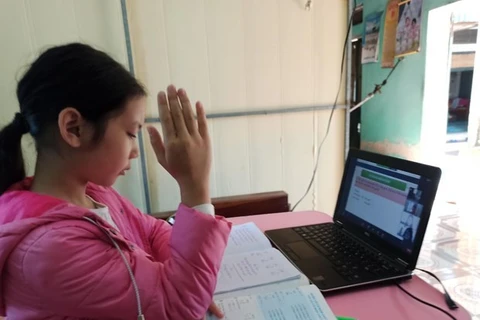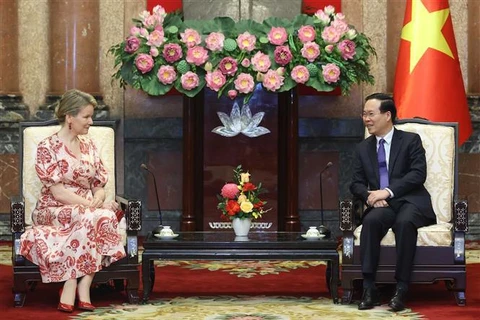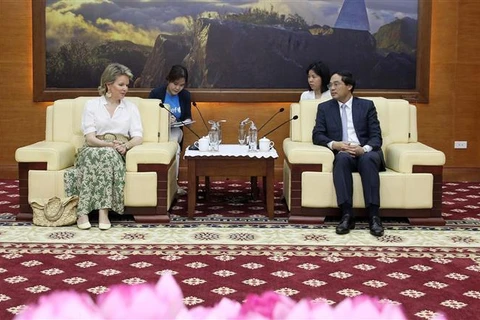 Belgium’s Queen Mathilde, who is Honorary President of UNICEF Belgium, visits Lao Cai province. (Photo: VNA)
Belgium’s Queen Mathilde, who is Honorary President of UNICEF Belgium, visits Lao Cai province. (Photo: VNA) UNICEF Vietnam said in a press release on May 11 that during her visit, Queen Mathilde witnessed how UNICEF Vietnam supports the Government to close equity gaps and expand opportunities for the most vulnerable children. She also interacted with children, teachers, mothers and fathers, health workers and Government officials, learning first-hand about Vietnam’s progress for every child.
“I have witnessed Vietnam’s progress towards ensuring its children are healthy, safe, educated, protected and empowered to reach their full potential,” she remarked. “There are still many challenges, but this visit has reaffirmed for me that there are innovative and creative approaches being designed and tested that greatly enhance the opportunities and improve the wellbeing of children across this country”.
At her meetings with President Vo Van Thuong and later, the Minister of Education and Training Nguyen Kim Son, the Queen referred to Vietnam’s achievements and learnt about national efforts to address children’s issues working closely with UNICEF.
She also recognised that this year marks 50 years of close collaboration between Vietnam and Belgium, “an opportunity for strengthening the longstanding ties of friendship and cooperation between the two countries.”
Following these discussions, she travelled to the northern mountainous province of Lao Cai, where she witnessed new approaches piloted by the Ministry of Education and Training, with UNICEF support, to improve the quality of learning and digital literacy among the youngest ethnic minority girls and boys.
The Queen observed how Augmented Virtual Reality (AVR) is being used to nurture curiosity, joyful learning and transferable skills for preschool students. This pilot programme is closing the digital divide for children in remote, mountainous regions and ensuring that ethnic minority children, who are least likely to complete primary and secondary school, get the best possible start to their education.
She also visited a community-based nutrition club, where she met mothers learning to better use local products to prepare nutritious meals for their families, particularly their young children. The clubs, initially launched with UNICEF support, are an example of where proven approaches are tested and scaled up by Government to reach even more children. In Lao Cai, the local health authorities have adopted this approach as a part of their efforts to reduce malnutrition rates in Lao Cai province in a context where child stunting rates reach over 37%.
On her last day in Vietnam, the Queen sat with a group of adolescents to talk about their concerns and mental wellbeing. She was pleased to note the work underway to promote positive mental health through actions that help children and adolescents to adopt and maintain healthy lifestyles, encouraging UNICEF and its partners to increase efforts to strengthen service provision, including by increasing budget allocation for mental health, integrating mental health into all social sectors, and improving referral systems at health-care facilities, schools and social welfare units./.
VNA
























